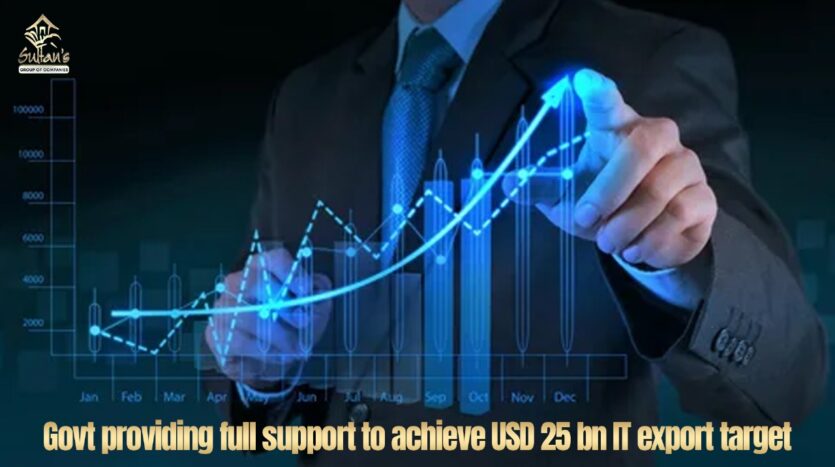Government’s Full Support to Achieve $25 Billion IT Export Target: Unlocking Pakistan’s Tech Potential
Pakistan’s IT sector has been making remarkable progress in recent years, and the government is now setting ambitious targets to take it to the next level. With a vision to achieve $25 billion in IT exports, the government is providing full support to tech companies, startups, and freelancers to boost the country’s digital economy.
From policy reforms to financial incentives, infrastructure development, and skill-building initiatives, the government is taking strategic steps to position Pakistan as a global IT powerhouse. Let’s explore how these efforts are shaping the future of the IT industry and creating immense opportunities for businesses and professionals alike.
Government Initiatives to Boost IT Exports
1. Special Tax Incentives for IT Companies
One of the biggest hurdles for IT companies in Pakistan has been the tax structure. To encourage growth, the government has introduced tax exemptions and reduced tax rates for IT exports. This move makes it easier for tech businesses to operate, reinvest, and expand their operations internationally.
Additionally, the removal of restrictions on foreign currency retention allows IT firms to keep a portion of their earnings in foreign currency, making international transactions more seamless.
2. Establishing IT Parks and Special Economic Zones
To provide world-class infrastructure for IT companies, the government has been investing in the development of IT parks and Special Economic Zones (SEZs). These zones offer:
✅ High-speed internet connectivity
✅ State-of-the-art office spaces
✅ Tax holidays for startups and established companies
✅ Business-friendly regulations
The Karachi IT Park, Islamabad IT Park, and Lahore’s Technology City are some of the key projects that will drive innovation and attract global investors to Pakistan’s IT sector.
3. Skill Development and Training Programs
A strong IT workforce is essential to achieving the $25 billion IT export target. The government, in collaboration with industry leaders, is launching multiple skill development programs:
🎓 DigiSkills.pk – A free online platform training thousands of freelancers in digital skills.
🎓 E-Rozgar Program – Helping youth learn remote work and freelancing skills.
🎓 National Incubation Centers (NICs) – Providing startups with mentorship, funding, and networking opportunities.
With a rapidly growing pool of skilled software developers, AI specialists, blockchain experts, and cybersecurity professionals, Pakistan is positioning itself as a global IT hub.
Freelancing & Startups: The Backbone of IT Exports
Pakistan is the fourth largest country in the world when it comes to freelancing. With over 3 million freelancers, the country has a huge potential to generate IT export revenue through platforms like Upwork, Fiverr, and Freelancer.com.
The government is making efforts to facilitate freelancers by:
💳 Easing payment solutions – Enabling PayPal alternatives and fast-tracking bank transfers.
💻 Providing co-working spaces – Establishing affordable work hubs across major cities.
📈 Offering tax breaks – Reducing tax burdens on freelance earnings to encourage growth.
At the same time, startups in fintech, edtech, e-commerce, and SaaS (Software as a Service) are receiving government support in terms of funding, incubation, and global market access.
Encouraging Foreign Investments in IT Sector
To achieve the $25 billion export goal, attracting foreign direct investment (FDI) is crucial. The government is implementing business-friendly policies to encourage global tech giants to invest in Pakistan’s IT sector.
Key Efforts Include:
✅ Ease of Doing Business Reforms – Simplifying company registration, tax filing, and compliance processes.
✅ Foreign Investment Protection Act – Ensuring security and legal protection for foreign investors.
✅ Public-Private Partnerships – Collaborating with global tech firms to set up research and development (R&D) centers.
Major companies like Microsoft, Google, and Alibaba Cloud are already showing interest in expanding their operations in Pakistan, a clear sign of a bright future ahead.
Expanding Global Reach Through Trade Agreements
The government is actively working on bilateral trade agreements with countries like the US, UK, UAE, and China to facilitate IT exports. Special agreements with Silicon Valley firms and Middle Eastern investors are expected to open new doors for Pakistan’s tech industry.
Additionally, efforts to integrate Pakistani tech firms into global supply chains will further accelerate the growth of IT exports.
Challenges & The Road Ahead
While the outlook for IT exports is promising, challenges remain:
🔴 Infrastructure gaps – Many IT businesses struggle with power shortages and internet connectivity issues.
🔴 Bureaucratic hurdles – Business owners still face delays in company registration and tax processing.
🔴 Cybersecurity concerns – The need for improved data protection laws and secure digital transactions is crucial.
The government is actively working to address these challenges through policy reforms and infrastructure investments. By continuing this momentum, Pakistan can position itself as a top player in the global IT industry.
Conclusion: A Bright Future for Pakistan’s IT Sector
With full government support, strong policy initiatives, and a rapidly growing talent pool, Pakistan is well on its way to achieving the ambitious $25 billion IT export target.
This transformation will not only boost the economy but also create thousands of job opportunities, elevate Pakistan’s position in the global digital landscape, and attract foreign investments in the tech sector.
For businesses and investors, NOW is the perfect time to be part of Pakistan’s IT revolution!
💡 Are you ready to invest in Pakistan’s tech future? Connect with Sultan’s Group of Companies today! 🚀




